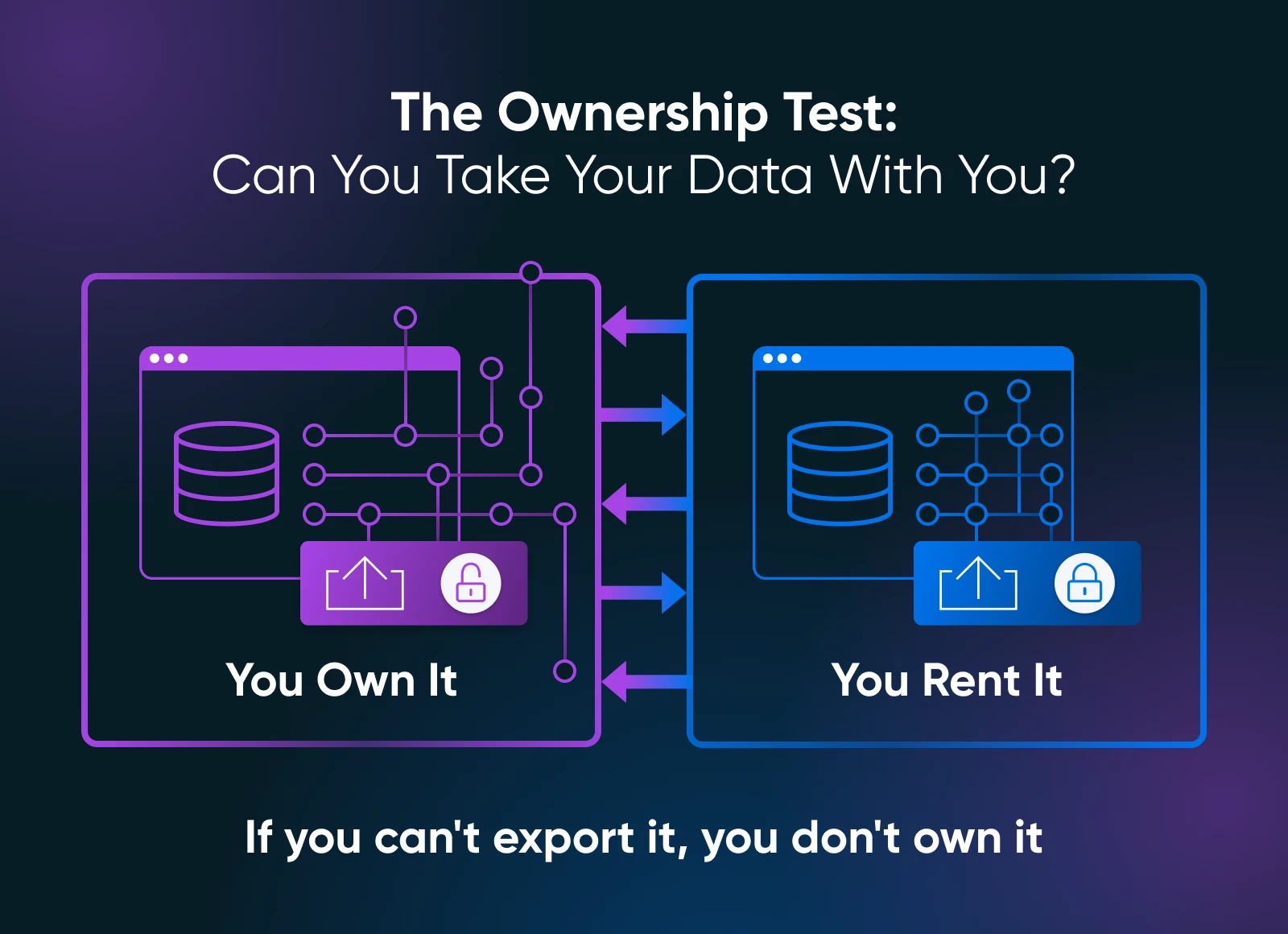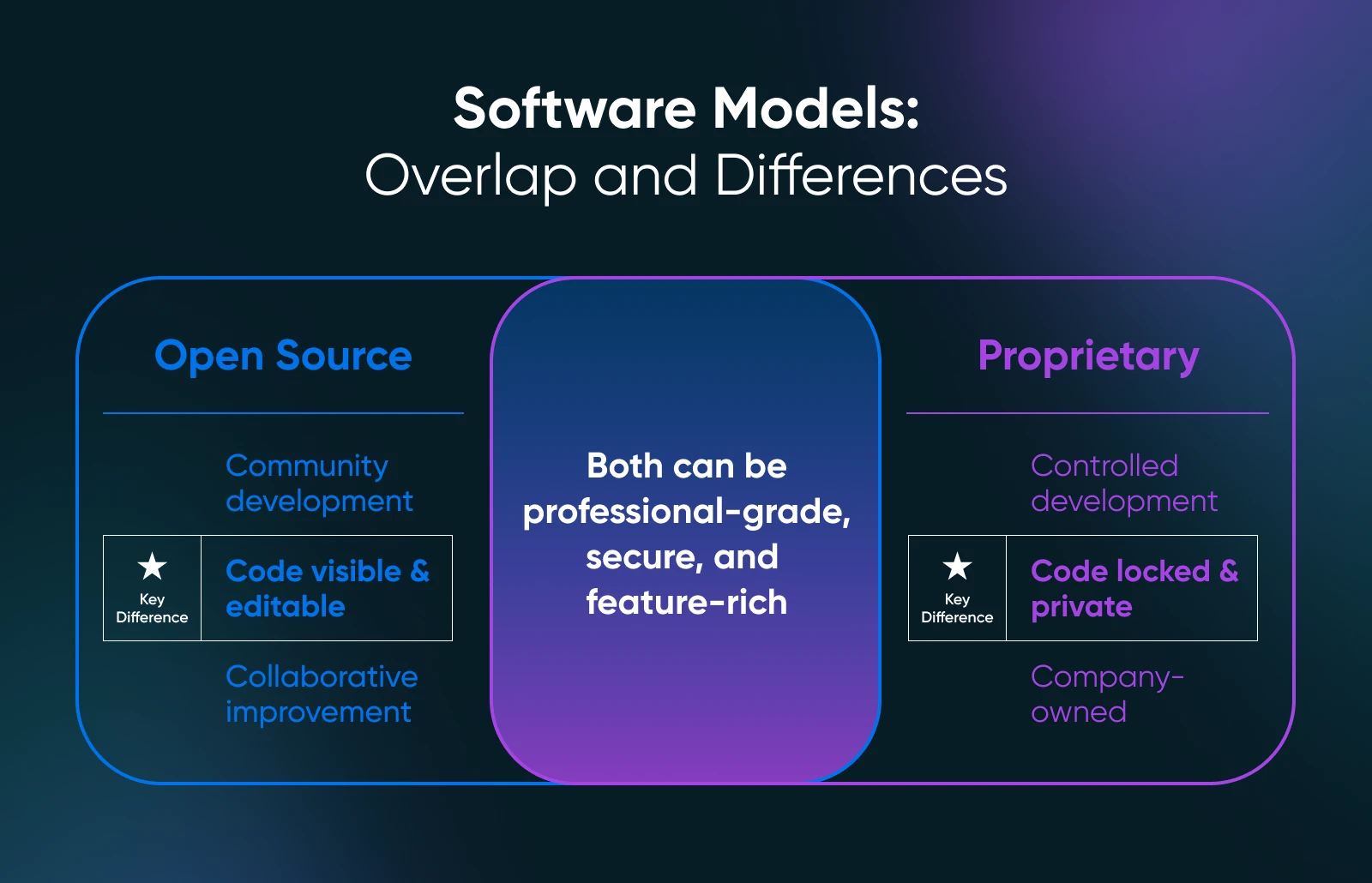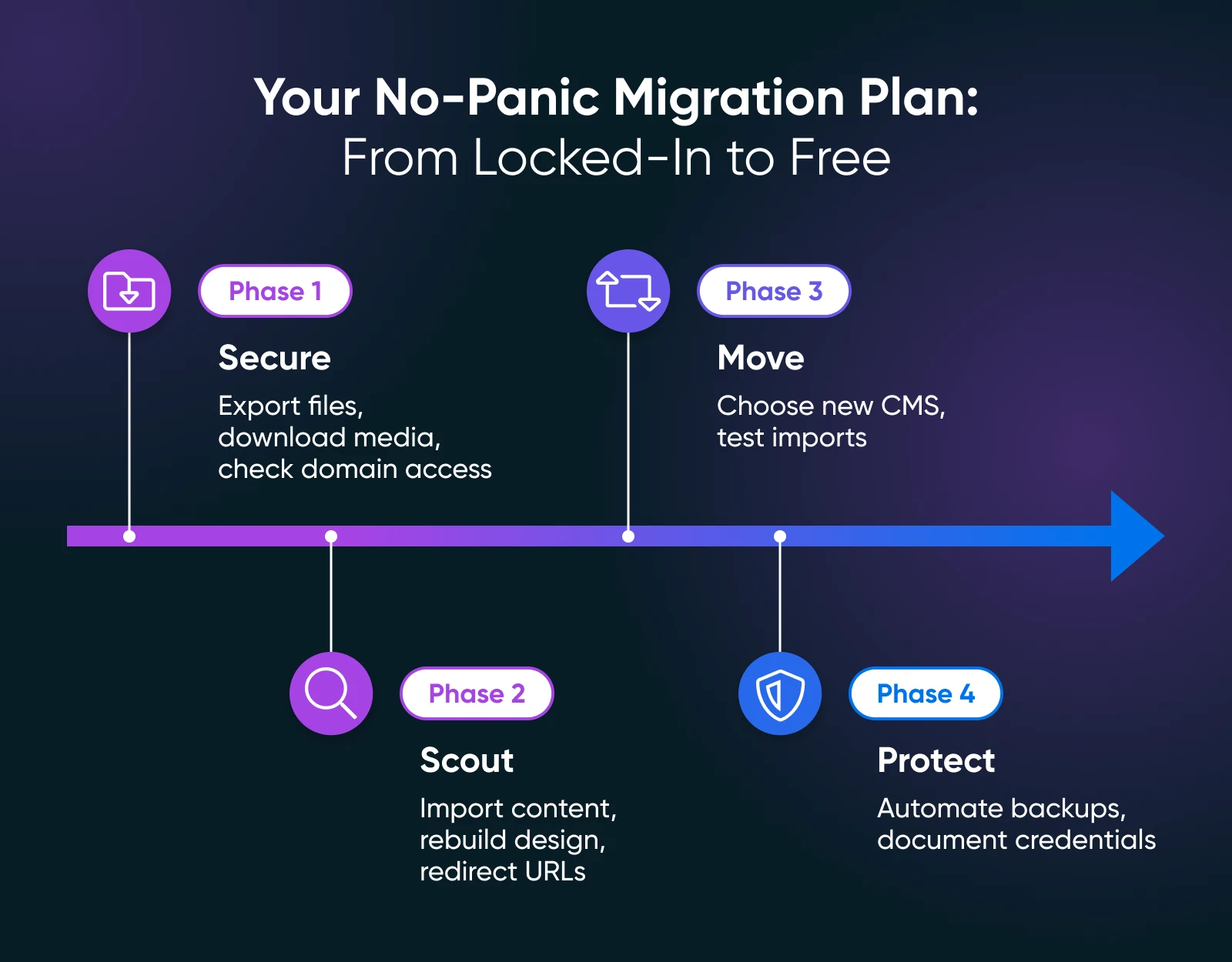You shut your café on the finish of an early fall night, head house, and hearth up your laptop computer to publish tomorrow’s pumpkin spice croissant teaser…solely to find your web site has been changed by a clean web page stating “Plan expired —renew to regain entry” in a deceptively cheery font.
It’s 9:07 p.m.
You know you paid your invoice.
But right here you might be, unable to entry your personal web site. Even worse —your clients can’t entry it both.
That’s the second when it clicks: simply since you pay on your web site doesn’t essentially imply you personal it. If you determined you needed a simple, drag-and-drop web site and signed up for the best, most inexpensive web site builder you would discover, you in all probability didn’t even notice you had been handing the keys to your on-line storefront to another person —together with the export button, uncooked analytics, and perhaps even your buyer e-mail checklist.
That’s what we’re about to dive into. On this article, we’re breaking down what “web site possession” even means (learn information portability), show you how to run a five-minute self audit to see who has which keys to your web site, and go over some choices you’ll be able to discover to strike the right steadiness between comfort and autonomy on-line.
Prepared to search out out whether or not you’re the owner or the tenant of your personal nook of the web?
TL;DR:
- Possession ≠ cost. You actually “personal” your website provided that you’ll be able to export and transfer your content material, design property, information, and infrastructure entry with out friction. That hinge is known as information portability.
- Run the 5-minute self-audit. We’ll stroll you thru scoring your website’s information portability to see if in case you have any weak hyperlinks in your possession.
- Select your route (or combine):
- Proprietary = velocity & simplicity now, however tougher to go away down the road.
- Open supply (like WordPress) = flexibility and full management, however with extra setup and upkeep.
- Most companies fall someplace within the center.
- Already utilizing a website builder? Don’t panic. Observe our four-phase plan to take over possession of your information.
The underside line: Proudly owning your website means proudly owning your exit. Preserve copies, hold management, and hold your choices open.
Now, let’s dig in.
What Web site Possession Actually Means
Take a minute and film “web site possession.” In your thoughts’s eye, do you see one thing like a deed? Some type of possession doc, like you’ve for a automobile or a house?
Sadly, possession on the net doesn’t actually work that manner. Relating to proudly owning a web site, you must take into consideration 4 fundamental items of your website: the content material, the design, the info, and the infrastructure. Each sits by itself authorized footing.
You may even maintain the keys to one in all them and get locked out of the others.
The 4 Pillars You Would possibly (or Would possibly Not) Personal
The 4 components of your website that you could be (or might not) personal are:
1. Content material
This contains weblog posts, product pages, pictures, and replica. Most platforms say this belongs to you, however some restrict content material exports to a partial XML file or flat HTML that strips out essential items like metadata and website positioning tags. It is a massive deal, as a result of if issues like your headings, alt textual content, and slugs vanish on export, your hard-won search rankings can vanish too.
2. Design and theme
This contains templates, CSS tweaks, and any bespoke code. When you construct your website utilizing an open-source platform, you’ll be able to zip up a theme folder and take it with you. In proprietary techniques, the template license usually forbids reusing it elsewhere —which means you merely “hire” your website’s appear and feel, and when you migrate your website to a brand new platform, it could imply needing to redesign from scratch, no matter how that impacts your branding (and price range).
3. Buyer and analytics information
This contains e-mail subscribers, kind submissions, buy historical past, behavioral analytics, and different information. Underneath privateness legal guidelines, you personal the non-public information you acquire, however entry might be one other story. Some web site builders prohibit uncooked CSV exports or API calls to increased tier paid plans.
And with out port-out entry, migrating to a brand new CRM or advertising platform turns into a handbook copy/paste marathon that may take tons of time and expose your information to gaps and errors.
4. Infrastructure
This contains your area title registration, internet hosting setting, and backups. You by no means actually personal a site (ICANN grants an unique proper of use that must be renewed periodically), and only a few small companies purchase bodily servers. However it is best to management the registrar login, DNS data, and off-platform backups. That manner, if a number yanks the service, you’ll be able to redeploy elsewhere inside hours as a substitute of weeks. Dropping DNS or backup entry is the digital equal of misplacing your retailer keys and the insurance coverage coverage, so having a mitigation plan able to go is significant.
The Key: Information Portability
The litmus check for possession on-line is information portability: the power to take your information, in a structured, machine-readable format, and transfer it elsewhere with minimal friction.
Europe put this concept into regulation beneath GDPR Article 20, which says controllers on your web site should hand over information “with out hindrance” if you ask for it.
The underside line is that this: When you can’t export what you create, you don’t totally personal it. Possession is management, and management on the net is portability.

5-Minute Web site Possession Self Audit
Wish to see who owns which keys on your website? Seize a cup of espresso and run via this guidelines.
1. Content material export check:
- Are you able to generate a full website export proper now?
- Does the file embrace media, permalinks, and website positioning metadata?
- Bonus: Open the file — are you able to learn it with out proprietary software program?
When you answered sure to all of those questions: 1 level
2. Design portability check:
- Find your present theme or template license. Does it permit migration?
- When you’ve added customized CSS/JS, do you’ve these recordsdata saved domestically?
When you answered sure to all of those questions: 1 level
3. Information liberation check:
- Go to your analytics dashboard; is there a one-click CSV or JSON export?
- Does it have a paywall or require a plan improve?
When you answered sure to the primary query and no to the second: 1 level
4. Infrastructure management check:
- Log into your area registrar; are you (not an company) the listed admin contact?
- Do you’ve a minimum of one current off-platform backup of your total website?
When you answered sure to all of those questions: 1 level
Rating your self:
- 4 factors: You personal your website. Congrats!
- 2-3 factors: You’re a cushty renter, however might wish to negotiate for extra keys.
- 0-1 factors: You’re a digital sofa surfer. Preserve studying for extra suggestions.
Selecting Your Route: Proprietary vs. Open Supply
When you’ve tallied your Web site Possession Self Audit, you’ll have a option to make: Proprietary or open supply? If you construct a web site, you’ll be able to select a turnkey expertise utilizing an all-inclusive website builder that provides a simple, near-instant launch, however prices a few of your freedom. On the different finish of the spectrum, you’ll discover open supply platforms that require you (or your employed developer) to put in each plugin and pull each lever.

Most companies land someplace within the center over time. Possibly you begin on a proprietary platform to validate an concept, then graduate to WordPress (the web’s hottest open-source platform) if you want deeper website positioning controls. There’s additionally managed internet hosting, which will get you the liberty of an open supply platform with extra help.
Within the subsequent two sections we’ll unpack each ends of the spectrum that will help you resolve what most closely fits your small business wants, price range, ability set, and progress plans.
Proprietary Platforms: Comfort and Consolation First
Image a turnkey rental. It has freshly painted partitions, a concierge on name, and a single month-to-month payment that covers facilities like a gymnasium and a pool. Proprietary website builders offer you that very same shiny comfort:
- No-code setup that has your website up and operating in minutes: Premade templates, AI format instruments, and bundled internet hosting imply you’ll be able to launch a brochure website earlier than lunch.
- Computerized upkeep: Core updates, safety patches, and backups are dealt with backstage, releasing you to concentrate on your small business relatively than server logs.
- One vendor, one help line: When one thing breaks, you open a single chat window. There’s no finger pointing between theme authors, plugin builders, and hosts.
That’s actual comfort, so it’s no marvel so many early-stage companies flock to easy website builders. They make an excellent beginning block. The catch seems if you attempt to transfer out of the rental:
- Partial or messy exports: Sure kinds of content material (for instance, audio, video, product, and portfolio pages) might not come out in a typical XML export, requiring you to repeat them manually.
- Laborious stops on whole-site migrations: Some website builders merely don’t will let you embed or export a whole website elsewhere. At greatest, you’ll be able to transfer particular person property with additional steps.
- Hidden switching prices: Past technical limits, you might run into proprietary workflows, multi-year contracts, and retraining time that create “course of” and “contractual” friction that inflates the actual value of shifting on.
If velocity to market is extra vital to your small business than long-term flexibility, a proprietary web site builder can nonetheless be a sensible on-ramp. Simply bookmark the export coverage now, earlier than tomorrow’s roadmap bins you in.
Open Supply Platforms: Freedom First
Now think about shopping for a fixer higher with a large workshop out again. That’s what an open-source CMS is like. You not solely get the keys to each room; but additionally the blueprints and the liberty to renovate nonetheless you need. For enterprise house owners constructing web sites, meaning:
- Limitless customization: WordPress alone provides greater than 60,000 free plugins — the whole lot from Stripe funds to head-turning 3D sliders — constructed by its huge international group.
- Full information possession: Your posts reside in a MySQL database you management. Export them as XML, JSON, or uncooked SQL, spin up a staging clone, or transfer hosts with a single .zip.
- Tech stack neutrality: Want a React entrance finish later? Hook WordPress up as a headless CMS. Wish to offload pictures to a CDN? Drop in a plugin and go.
However that freedom comes with some potential downsides that make some entrepreneurs take pause:
- DIY upkeep: You (or somebody you rent) has to deal with updates, backups, and safety hardening.
- Studying curve: Extra freedom means extra knobs. Count on to spend time (or price range) dialing in your website’s efficiency and design.
- Evaluation paralysis: An ocean of themes and plugins can simply overwhelm first-time website house owners.
Nonetheless, for companies eyeing customized buyer portals, nuanced website positioning management, or future internationalization, open supply pays for itself in optionality. The platform’s flexibility outstrips proprietary CMSs exactly as a result of no single vendor dictates its roadmap. Open supply is sweat fairness up entrance, however sovereignty without end after. If in case you have (or can rent) the chops, you’ll by no means must rebuild when the following stage of progress arrives.
| Function | Proprietary Platforms | Open Supply Platforms |
| Setup Velocity | Instantaneous setup with templates and AI instruments | Slower, requires handbook setup and configuration |
| Upkeep | Computerized (updates, safety, backups) | DIY or outsourced; requires ongoing consideration |
| Assist | One vendor, one contact | Neighborhood-based or third-party suppliers |
| Customization | Restricted to platform’s instruments and templates | Just about limitless through plugins, themes, and code |
| Information Possession | Typically partial or restricted exports | Full management with versatile export choices |
| Migration Flexibility | Laborious to maneuver; proprietary lock-in | Straightforward emigrate or replatform as wanted |
| Studying Curve | Low; made for non-technical customers | Larger; extra instruments, extra complexity |
| Price Over Time | Could embrace hidden prices or vendor lock-in | Doubtlessly decrease long-term price, particularly at scale |
| Greatest For | Quick, easy brochure websites or MVPs | Scalable, customized, and future-proof enterprise websites |
Already on a Proprietary Builder? Your No-Panic Migration and Resilience Plan
When you’re on a closed platform now, it’s not the tip of the world. Consider shifting off it like shifting a brick-and-mortar retailer. You wouldn’t toss your cabinets within the truck with out first labeling the bins, forwarding the mail, and telling Google Maps the place you’re headed. There are logistics to think about and it’ll take work, however with time and planning, you’ll be able to take again your website’s keys.
Observe the four-phase plan beneath (no coding required),and also you’ll defend your website’s content material and infrastructure and pave the best way for a pain-free change everytime you’re prepared.
Section 1: Safe What You Have
Do that right now.
- Run your platform’s fullest export (proper now): Most builders allow you to obtain a minimum of an XML or CSV. Do that, even when it’s imperfect, a partial backup beats none. Save a duplicate in cloud storage you management.
- Obtain a handbook media archive: Open your website’s file supervisor or gallery, choose all pictures and movies, and bulk-download them into dated folders.
- Snapshot your analytics and buyer lists: Export CSVs of kind submissions, e-newsletter sign-ups, and buy historical past so you’ll be able to import them later.
- Test your area registrar login: Affirm you, not an company or former freelancer, are the admin contact (and that your e-mail on file is present).
Section 2: Scout Out Your Subsequent On-line Dwelling
Do that a few month earlier than you propose emigrate your website.
- Select Your Vacation spot CMS: WordPress dominates for flexibility, however contemplate different open supply choices (like Craft or Ghost) to be sure you’re getting the very best match for your small business wants, particularly when you desire a leaner setup.
- Take a look at import a single export file: Add the file, watch it unpack, then evaluate what carried over and what didn’t. Preserve a listing of things that didn’t import; you’ll repair these in Section 3.
Section 3: Pack, Polish, and Redirect
Do that if you migrate your website.
- Bulk import your remaining content material: The precise format and course of will depend upon the CMS you selected.
- Rebuild your design (or improve it): Choose a theme that echoes your outdated look, then paste any saved CSS tweaks. Add your archived pictures so inside hyperlinks aren’t damaged.
- Map your URLs earlier than going reside: Use a spreadsheet: authentic URL in column A, new URL in column B. After you turn your DNS, set up a redirection plugin and bulk import the checklist so engines like google (and clients) by no means see an Error 404.
- Take a look at on a number of units: Be certain that the whole lot seems to be prefer it ought to on completely different display screen sizes. Crawl the location with a device like Screaming Frog to catch stray hyperlinks.
Section 4: Future Proof Like a Professional
Do that on an ongoing foundation after migration is full.
- Automate backups: Schedule every day database and weekly full-site snapshots.
- Preserve your plugins lean: Solely activate extensions you actually use. Fewer dependencies means sooner efficiency and easier migrations down the street when you ever want to maneuver your website once more.
- Doc your credentials: Preserve a safe word with logins on your registrar, internet hosting supplier, and CDN. That manner, a employees change by no means strands you outdoors your digital storefront.

How DreamHost Retains the Keys in Your Fingers
Proudly owning a web site is about who controls the exit door.
Comfort-first proprietary web site builders are implausible launchpads, till you want a customized characteristic the platform received’t allow you to bolt on.
Freedom-first open-source stacks demand extra elbow grease…however repay you with limitless renovation rights.
However most websites land someplace within the center. At DreamHost, we’re pro-platform-choice, and we provide managed WordPress internet hosting that offers you all the liberty of an open supply platform mixed with award-winning, 24/7 help, plug-and-play degree web site constructing ease, and actual information portability.
DreamHost bakes in freedom with:
- One-click, platform-agnostic backups: Obtain full website archives or automate off-site snapshots with no additional plugin charges.
- Area registrar management: Handle DNS, WHOIS, and transfers in a single dashboard you, not a middle-man, personal.
- Open supply the whole lot: From WordPress to superior stacks, we by no means wall you right into a proprietary panel.
- Human help across the clock: Our help workforce speaks PHP, DNS, and plain English.
DreamHost doesn’t simply hire you a plot. We hand you the keys.
Did you get pleasure from this text?









